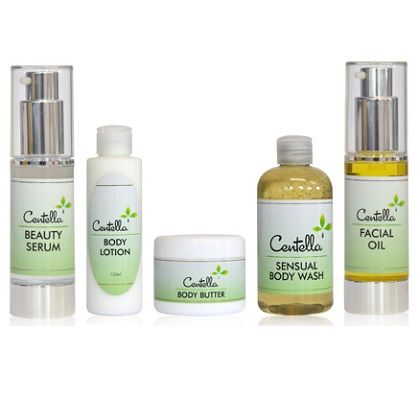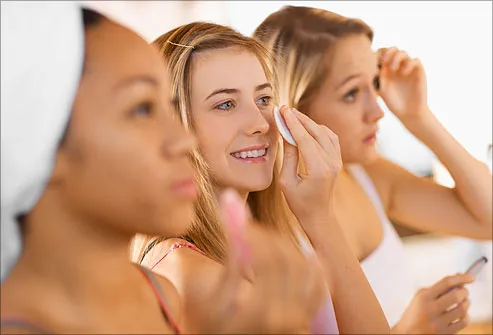 All botanical products have main and active ingredients that are derived from natural or plant sources formulated without the use of harsher synthetic (and in my view, unnecessary) chemicals as found in most of the high street brands. All fragrances are essential oil blends; all from plants and even the cleansing agents/detergents in body washes are plant-derived. The only synthetic ingredient in some of these products is the preservative which is not used in all products (eg. those that contain vitamin E because it is an antioxidant and therefore a natural preservative), only in some. Preservatives are a vital ingredient in skincare products as otherwise, the product will quickly become rancid causing it to degrade; this can produce toxic compounds which can prove harmful to the skin – NOT GOOD!
All botanical products have main and active ingredients that are derived from natural or plant sources formulated without the use of harsher synthetic (and in my view, unnecessary) chemicals as found in most of the high street brands. All fragrances are essential oil blends; all from plants and even the cleansing agents/detergents in body washes are plant-derived. The only synthetic ingredient in some of these products is the preservative which is not used in all products (eg. those that contain vitamin E because it is an antioxidant and therefore a natural preservative), only in some. Preservatives are a vital ingredient in skincare products as otherwise, the product will quickly become rancid causing it to degrade; this can produce toxic compounds which can prove harmful to the skin – NOT GOOD!Whilst I am not a fan of synthetic chemicals, the safety of any product is paramount and should not be compromised in the interests of being 100% ‘natural’, 100% ‘organic’ and 100% free of ‘chemicals’. The human body is full of organic chemicals and many brands play into our need for all things natural and combined with an unhealthy obsession with youth, the prices of some of these products can makes one’s eyes water!
It is safe to say that no product can be truly 100% natural given our lifestyles. Most skincare products will last between 6-12 months with preservatives (otherwise it will last between 2-3 weeks at best and only in a fridge!). Equally important is that no botanical skincare products should have been tested on animals. I have compiled the following in case you are interested in knowing more about skin health and good skincare regimes.
Our skin is the largest organ in the body and requires nourishment from the inside as well as from the outside. The state of our skin can say a lot about the state of our health and make-up can fix immediate problems but only up to a point! The rest has to come from our own efforts sadly, and largely dictated by our individual constitutions determined by our physiology and genetics.
Feeding the skin (internal nourishment)
• Diet & nutritional status
• Lifestyle practices
• Skin products (dispelling common myths)
• Skin hygiene & skincare regimes
Good skincare practices (external nourishment)
Lifestyle practices
- Exercise – necessary to improve blood flow to the skin surface. This will ensure that the nutrients for the skin reach the cells and encourage good repair and growth of new cells.
- Smoking – this promotes premature ageing of the skin as the chemicals in cigarettes destroy the connective tissue components in the skin. Loss of elasticity, resilience and premature wrinkle formation are all classic hallmarks of cigarette smoking.
- Alcohol – has a dehydrating effect on all the cells in the body, including the skin. Excessive alcohol makes the skill look dry and lacklustre.
- Diet (see my previous post on how diet is crucial to skin health:
Skin products
- Cleansers – can range from lotions, gels and wipes to simply using soap. Absolutely vital in skin regimes as the dirt and grime need to be removed at the end of the day. This is more important in a climate of increased pollution and if living in busy cities. It is best to stick to a cleansing routine or product that is compatible with skin type and texture rather than trying out new products for the sake of fashion or marketing claims of a ‘new and improved’ product.
- Moisturisers – absolute must, particularly for older skins. This replenishes the skin of moisture that is slowly depleted from the skin throughout the day. Important to invest in good products that have a sunscreen factor. Lotion is better for the day and a night cream is essential for night time moisturising. Older skins require more care than younger skins although with levels of pollution and environmental toxins aplenty, one is never too young to start a rigorous skin care regime. Again, it is best to stick to something that is tried and tested and is compatible with your skin. By far the best moisturiser is a combination of good diet, lifestyle and an effective skincare regime.
- Exfoliating rubs & treatments – these are designed to remove dead skin cells from the uppermost layer of skin. Normally they slough off at a steady rate but sometimes, they can slow down (many factors affect this) and build up on the skin surface. This gives the skin a dull and lacklustre appearance so exfoliating with a product or simply massaging it with a flannel (face) or a loofah mitt (body) will assist the process. Good moisturising afterwards is essential to prevent the skin from drying out
- Anti-winkle creams – there are many claims made by manufacturers of creams, lotions and gels all of which promote the notion of being able to defy the ageing process. Many of these products are ridiculously expensive and very often unnecessary as no amount of anti-wrinkle remedy will counteract the long-term effects of poor diet, smoking, excessive alcohol intake and sun damage. More fundamental factors beyond the environment such as genetic inheritance have an overriding influence in some people. Time and money is better invested in a more natural approach to healthy skin which incorporates some lifestyle changes and good nutrition as a foundation for limiting the worst effects of ageing.
- Cellulite-busting creams – again, more commercial and marketing hype than actual effectiveness. A more radical examination of society’s view on body image and what is considered beautiful and healthy is required. Healthy skin and a healthy body requires discipline, hard work and a dedicated approach to proper nutrition and exercise. No amount of marketing gimmick is going to alter that.
Skin hygiene & skincare regimes
- Cleansing – removes dirt and grime that has built up during the day and must be removed before bedtime
- Moisturising – replenishes important moisture that has been lost throughout the day. Some products also encourage repair and growth of new skin cells
- Exfoliating – removes old skin cells from the surface of the skin which can sometimes remain in the uppermost layer and give the complexion and dull and lacklustre appearance
- Massaging – encourages blood flow to the skin surface so that important nutrients can reach the skin surface. Also encourages repair of damaged skin cells and some massages (eg. lymphatic drainage) actively encourage the removal of toxins and lactic acid build up with has other health benefits in addition to improving the health of the skin
- Cellulite – the term given to the manner in which fat is deposited under the surface of the skin. Characteristic dimpled and ‘orange peel’ effect is more common in women and in those who have a poor diet, poor skin circulation and those who do not take enough exercise, although this is not always the case. Cellulite is age-related being more common in the older woman. Worst excesses can be offset through regular exercise, limiting caffeine and fast foods and regular massage and skin brushing to promote circulation to the skin
- Nourishing (food) – eating the right foods is vital to healthy skin. See above for recommendations
- Sun exposure – excessive exposure to strong sunlight, particularly without adequate sun protection is disastrous for the skin especially fair skins which are prone to sunburn. The risks for cancer increase in previously sunburnt skins so avoiding this is a sensible precautionary measure.
- Cold weather, wind and rain can also wreak havoc on the skin. Adequate protection with good moisturising properties as well as sun protection (even on grey, dull days, UV damage is still possible)

 For botanical skincare products, please visit www.centellaskincare.co.uk
For botanical skincare products, please visit www.centellaskincare.co.uk 
No comments:
Post a Comment